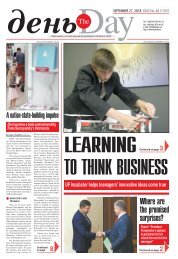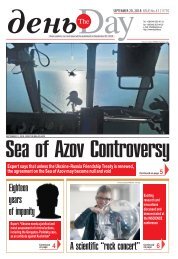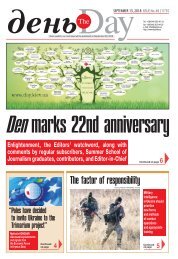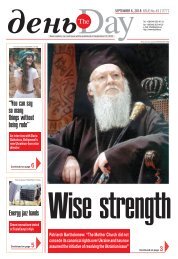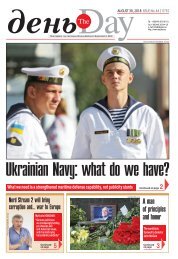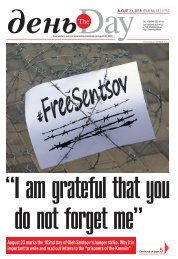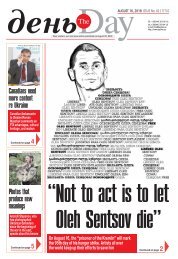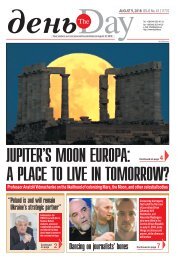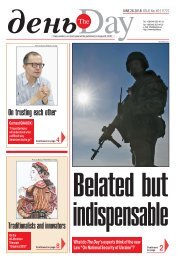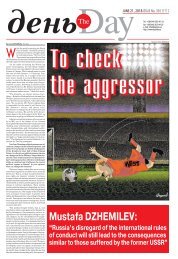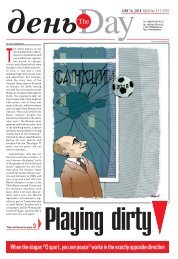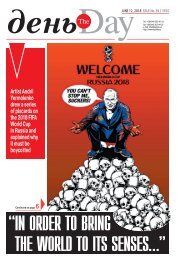#38_1-8
You also want an ePaper? Increase the reach of your titles
YUMPU automatically turns print PDFs into web optimized ePapers that Google loves.
JUNE 19, 2018 ISSUE No. 38 (1170)<br />
Tel.: +38(044) 303-96-19,<br />
fax: +38(044) 303-94-20<br />
е-mail: time@day.kiev.ua;<br />
http://www.day.kiev.ua<br />
Victorious quick<br />
march in Scotland<br />
Photo by Borys KORPUSENKO<br />
Den’s journalists met at<br />
Boryspil Airport the Ukrainian<br />
soldiers and veterans who took<br />
part – for the first time and<br />
successfully – in the Cateran<br />
Yomp international competition<br />
Photo by Ruslan KANIUKA, The Day<br />
Will Russia<br />
2<br />
Continued<br />
on page<br />
Continued on page 4<br />
release its prey?
2<br />
No.38 JUNE 19, 2018<br />
DAY AFTER DAY<br />
WWW.DAY.KIEV.UA<br />
By Serhii HRABOVSKYI<br />
On the opening day of the<br />
soccer World Cup, the All-<br />
Russian Center for the<br />
Study of Public Opinion<br />
(known by the Russian<br />
acronym VTsIOM) unveiled a survey<br />
of the main features of the image of<br />
the Russian people as perceived by the<br />
Russians themselves. One could mark<br />
up to five such features out of the list<br />
proposed by the pollsters. Thus, it<br />
turned out that the Russians saw<br />
themselves mainly in a positive and<br />
very positive light. According to<br />
respondents, the main quality of the<br />
Russians is hospitality (it was named<br />
by 45 percent), followed by capacity for<br />
hard work (41 percent), and<br />
spirituality (33 percent). The Top 5<br />
also includes generosity (named by<br />
26 percent of respondents) and<br />
sociability, which was noted by<br />
25 percent of respondents. The<br />
strength of Russian people almost<br />
made it to the top, named by 23 percent<br />
of those polled.<br />
Interestingly, only 18 percent noted<br />
high education level as a characteristic<br />
feature of the Russians, while<br />
17 percent of respondents named religiousness<br />
as one. Finally, 5 percent<br />
of the Russians consider themselves<br />
enigmatic, and 4 percent ironic.<br />
Regarding negative qualities,<br />
heavy drinking is the leader, having<br />
been named by 16 percent of respondents.<br />
Moreover, young people (those<br />
aged between 18 and 24 years) characterize<br />
the Russians as drunkards<br />
more often (25 percent) than do other<br />
age groups. Laziness is in the second<br />
The features of an image<br />
position of this “anti-ranking” with<br />
13 percent. The lack of discipline<br />
among Russians was noted by 6 percent<br />
of respondents, rudeness and<br />
wiliness each by 5 percent of the respondents,<br />
and only 2 percent mentioned<br />
weakness.<br />
It seems that these Russians are<br />
pure angels, except for being drunkards<br />
and sluggards. Of course, it is<br />
predicated on trusting the data of a<br />
state-sponsored polling agency. Unlike<br />
the websites of the leading<br />
Ukrainian pollsters (say, Rating),<br />
where one can easily access the most<br />
complete materials of the polls, the<br />
VTsIOM’s website does not provide<br />
access to these materials, citing software<br />
failures... But it would be very<br />
interesting, for example, to see how<br />
the question about the qualities of the<br />
Russian people was framed, in which<br />
order – alphabetically or otherwise –<br />
the proposed answers appeared in<br />
the questionnaire (there were 30 of<br />
them in total). There are other issues<br />
with it as well, but they are of a<br />
purely expert nature. And in general:<br />
how much can one trust any opinion<br />
poll dealing with matters of ideological<br />
importance for the regime in<br />
a neo-totalitarian state?<br />
However, if a significant part<br />
of respondents listed exactly those<br />
values that they believe to be most acceptable<br />
to the authorities (or those<br />
suggested by the state-sponsored<br />
pollsters), this is also an extremely<br />
significant indicator of the real social<br />
situation. “I think one thing, say<br />
the second, and mean the third” was<br />
the common practice in the Soviet<br />
time; at the same time, the majority<br />
of the USSR’s population genuinely<br />
ascribed to certain ideological dogmas<br />
and political myths that they felt<br />
comfortable with, which was famously<br />
described as “the unique<br />
pride of the Soviet citizen.”<br />
One could stop here, if not for the<br />
fact that three years before the justdiscussed<br />
all-Russian poll, theVTsIOM<br />
conducted another poll that dealt with<br />
a similar subject. The respondents<br />
were asked to mark the qualities of the<br />
Russian national character, separately<br />
grouped as positive and negative<br />
ones. It turned out that the most important<br />
positive features of that character<br />
were listed as kindness and honesty,<br />
nobility and decency; they were<br />
marked by 41 and 26 percent respectively.<br />
Readiness to assist each other<br />
and sociability were named by 13 percent,<br />
tolerance and dependability by<br />
12 percent, capacity for hard work also<br />
by 12 percent, hospitality by 10 percent,<br />
courage and perseverance, steadiness<br />
and purposefulness by 9 percent<br />
each. Such qualities as trust, peace-<br />
Do the Russians<br />
evaluate themselves<br />
adequately?<br />
fulness, optimism, patriotism, talent,<br />
justice, generosity were named by 1 to<br />
6 percent of respondents, and 14 percent<br />
hesitated to answer and failed to<br />
name any positive qualities. Meanwhile,<br />
the worst negative qualities of<br />
the Russian character were listed as the<br />
passion for alcohol and drugs (by<br />
43 percent of those polled) and carelessness,<br />
laziness, lack of initiative<br />
(23 percent). The Russians also named<br />
lack of culture, rudeness, boorishness<br />
(11 percent), brutality, anger, jealousy<br />
(11 percent), irresponsibility, mismanagement,<br />
disorganization (9 percent).<br />
A few percent each chose slowwittedness,<br />
excessive simplicity, character<br />
weakness, slavish obedience, excessive<br />
forgiveness, promiscuity,<br />
slovenliness, laxity, and indifference.<br />
A total of 17 percent of those polled<br />
failed to answer.<br />
As you can see, the Russian statesponsored<br />
pollsters have drawn some<br />
conclusions from that earlier poll: in<br />
this year’s questionnaire, the negative<br />
qualities of the Russians were not<br />
put into a separate rubric, so it resulted<br />
in a beautiful picture showing<br />
them as almost angels. However, it<br />
was only according to their “almost angelic”<br />
self-evaluation. I do not doubt<br />
that the devils in hell, if offered the<br />
questionnaire of 2018, would also<br />
portray themselves positively...<br />
But there was another important<br />
question in the 2015 survey. Respondents<br />
were asked to note the main positive<br />
and negative qualities of the modernWesterners.<br />
I donot know howhonestly<br />
Russians responded to the statesponsored<br />
pollsters’ questions, but...<br />
However,judgeforyourself:42percent<br />
of respondents could not name any<br />
positive qualities inherent in the Westerners.<br />
Those who mentioned such<br />
qualities chose high capacity for work,<br />
business efficiency (16 percent), responsibility,<br />
ability to keep themselves<br />
in good shape (10 percent), respect for<br />
each other and the law (9 percent),<br />
confidence in their strengths and abilities,<br />
purposefulness (8 percent), politeness,attentiveness(6percent).Afew<br />
percentofrespondentsnotedtheculture<br />
of behavior, thriftiness, prudence,<br />
pragmatism, vigor, honesty, tolerance.<br />
Among the main negative features of<br />
Western people, 15 percent named excessive<br />
fondness for money, 10 percent<br />
– arrogance and swaggering, presumptuousness<br />
and haughtiness, 7 percent<br />
– wiliness, rationalism, and selfishness,<br />
5 percent – indifference, lack<br />
of spirituality, insensitivity, heartlessness,promiscuity,<br />
debauchery.Less<br />
than 5 percent of respondents noted aggressiveness,<br />
individualism, contempt<br />
for people of other ethnicities, dislike of<br />
Russians, and the desire to interfere in<br />
other peoples’ affairs, brutality and insincerity.<br />
This is how, according to<br />
the VTsIOM, the Westerners were evaluated<br />
by ordinary Russians. And it<br />
does not really matter whether they<br />
spoke their hearts or were guided by the<br />
stereotypes of state propaganda, as the<br />
result is same: xenophobia and imperial<br />
haughtiness.<br />
By Ilia FEDOSIEIEV<br />
The very presence of political<br />
prisoners in any country is a<br />
shame in itself. Protesting<br />
it and demanding that they be<br />
freed do not need any justifications,<br />
explanations, or any<br />
special reasons.<br />
And nevertheless, those who went<br />
to picket the Russian embassy in<br />
Kyiv on June 16 had such reasons.<br />
But we will cover them below shortly,<br />
after saying more about the event<br />
itself.<br />
The protest organized by the community<br />
Free Political Prisoners of the<br />
Kremlin could not be called especially<br />
massive, but the word “littleattended”<br />
was also not suitable for it.<br />
The community gathered up to a<br />
hundred people, mostly young, since<br />
active youths are still quite numerous<br />
in Kyiv. The picket’s participants included<br />
relatives of the prisoners<br />
themselves, but for the most part<br />
they were activists without any personal<br />
connection.<br />
The only cause for regret was<br />
the fact that the protest was, in fact,<br />
directed into a void, as the embassy<br />
was closed for the weekend. Nobody<br />
could hear the demands of the protesters<br />
or answer them, and it is a<br />
pity, since it would be very interesting<br />
to hear such an answer. On the<br />
other hand, perhaps, it was precisely<br />
thanks to this that the picket went<br />
on without any incidents, and the police<br />
was frankly bored with inaction.<br />
Perhaps, this protest will not<br />
play a major role in itself, but it is<br />
likely that it will be the beginning of<br />
a much more significant process. Its<br />
organizers urge people to hold flash<br />
mobs around the world, picketing<br />
Russian diplomatic missions with<br />
the demand to release political prisoners.<br />
It cannot be ruled out that the<br />
Kremlin will at least partially satis-<br />
Photo by Borys KORPUSENKO<br />
Will Russia release its prey?<br />
fy these demands, as it cares about its<br />
international image. Incidentally or<br />
not, this initiative coincided with the<br />
head of Ukrainian diplomacy Pavlo<br />
Klimkin suggesting that the release<br />
of prisoners can occur during the<br />
World Cup. Well, let us wait and see.<br />
One of the additional reasons<br />
mentioned above is obvious. Mykola<br />
Karpiuk, Oleksandr Kolchenko,<br />
Yevhen Panov, Oleh Sentsov, Roman<br />
Sushchenko, and other prisoners<br />
of the Kremlin, who the protesters<br />
were talking about, are Ukrainians<br />
and suffering for Ukraine, so it<br />
is natural that their fellow citizens<br />
should be the first to stand up for<br />
them. Even if there was only one<br />
Ukrainian political prisoner in Russia,<br />
this would be a worthy cause for<br />
the whole of Ukraine.<br />
The second circumstance is not so<br />
noticeable, but if you look closely, it<br />
is more amazing. I mean the fact that<br />
from the point of view of the Russian<br />
law, the overwhelming majority of<br />
humanity is made of criminals. The<br />
only exceptions are those who recognize<br />
Crimea as Russian (yes, it is<br />
linked to Ukraine as well), but there<br />
are not many of them. And, of<br />
course, Ukrainians are criminals almost<br />
to a man.<br />
Now, if a Russian, a Ukrainian,<br />
a European, or an African considers<br />
the peninsula to be a legitimate part<br />
of Ukraine and expresses their opinion<br />
aloud, they are already guilty of<br />
the crime described by Article 280-<br />
1 of the Criminal Code of the Russian<br />
Federation, “Public calls for actions<br />
aimed at violating the territorial integrity<br />
of the Russian Federation.”<br />
It is punishable with up to four years<br />
imprisonment, and if committed using<br />
the Internet, it is described by<br />
Part Two of the same article, and<br />
punishable with up to five years. At<br />
the same time, it should be remembered<br />
that Russia itself is a universally<br />
recognized state, and consequently,<br />
judgments of Russian courts<br />
are recognized throughout the world<br />
as legitimate and valid.<br />
In practice, of course, most earthlings<br />
have nothing to fear, since the<br />
“hand of Moscow” is still not so long<br />
as to reach everyone. But nobody<br />
actually wants to do so. The principle<br />
of the Russian state’s actions is not<br />
to imprison everyone, but to let<br />
everyone know that they can be imprisoned<br />
at any time. To the greatest<br />
extent, this applies to those Ukrainians<br />
who are permanent residents of<br />
Russia or enter it, as they are very<br />
likely to be arrested, tried, and imprisoned.<br />
Finding a suitable post or<br />
comment on a social network is a simple<br />
task, and the find will be an irrefutable<br />
piece of evidence for the<br />
Russian court. This is true despite<br />
the individual in question only stating<br />
what the whole civilized world<br />
agrees with. Note that this is not terrorism,<br />
which Sentsov and other<br />
prisoners stand accused of. To prove<br />
terrorism, they need to collect evidence,<br />
while in the former case, they<br />
can grab anybody without even looking<br />
at them twice.<br />
And this makes the issue of political<br />
prisoners even more acute. Of<br />
course, it is possible and necessary to<br />
seek the release of those who are<br />
currently behind bars in Russia. But<br />
we must not forget that the article<br />
about which we are talking is an inexhaustible<br />
source of new political<br />
prisoners. What prevents Russia<br />
from grabbing two or three people under<br />
Article 280-1 tomorrow, having<br />
released one such prisoner today?<br />
The hope for a “worldwide flash<br />
mob” making an impact is certainly<br />
there. However, it is still desirable<br />
that its participants demand not only<br />
the release of prisoners, but also<br />
the repeal of the law that labels most<br />
Ukrainians criminals.
WWW.DAY.KIEV.UA<br />
DAY AFTER DAY No.38 JUNE 19, 2018 3<br />
By Mykola SIRUK, The Day<br />
One could hear a lot of interesting<br />
opinions at the<br />
recent conference “Israel’s<br />
Experience of Nation-Building:<br />
Lessons<br />
for Ukraine” held in Kyiv by New<br />
Europe Center and the Ukrainian<br />
Jewish Encounter. In particular,<br />
the audience in the Hotel Hyatt’s<br />
packed hall could hear from some<br />
leading Israeli politicians about the<br />
secrets of Israel’s success and,<br />
moreover, about how that country,<br />
which constantly faces terrorism,<br />
manages to remain democratic and<br />
provide security for its citizens<br />
without violating human rights.<br />
What testifies to a friendly nature<br />
of relations between the two<br />
states is an exchange of jokes. Israeli<br />
Ambassador Eliav Belotserkovsky<br />
told the audience that he once heard<br />
it said that Odesa is Israel’s northern<br />
city. On the other hand, Georgii<br />
Logvynskyi, co-chair of the Verkhovna<br />
Rada Group for Interparliamentary<br />
Contacts with the State of<br />
Israel, said that if the EU does not<br />
admit Ukraine, the latter must join<br />
Israel or, on the contrary, Israel<br />
must annex Ukraine.<br />
Opening the conference, New<br />
Europe Center director Aliona Hetmanchuk<br />
pointed out that Israel’s<br />
experience became especially attractive<br />
for Ukraine after Russia<br />
had begun a war against this country<br />
in the spring of 2014. “This may help<br />
us not so much to win the war as to<br />
carry out reforms,” she emphasized<br />
and expressed a hope that “after the<br />
conference, not only Israel will be<br />
more understandable to Ukraine but<br />
Ukraine will also be more interesting<br />
and understandable to Israel.”<br />
● “ISRAEL DEMONSTRATES<br />
HOW TO DAILY DEFEND ITS<br />
TERRITORY AND PEOPLE”<br />
Ivanna Klympush-Tsintsadze,<br />
Vice Prime Minister of Ukraine for<br />
European and Euro-Atlantic Integration,<br />
also spoke of the importance<br />
of Israel’s experience for<br />
Ukraine. “Israel demonstrates and<br />
inspires how to daily defend its territory<br />
and people, how to do this successfully<br />
and confidently,” she emphasized.<br />
In her words, Israel can, as<br />
no one else, understand Ukraine<br />
which has to live in a state of constant<br />
tension and military threat<br />
from a hostile neighbor.<br />
Ukraine is facing a lot of challenges<br />
that Israel knows, she said,<br />
and we hope to be inspired by the<br />
ability of Israelis to make effective<br />
international diplomatic efforts and<br />
to make use of Israel’s experience in<br />
the field of education and innovations.<br />
In her words, there are many<br />
things Ukraine can learn from Israel<br />
which, even though being in unfavorable<br />
climatic conditions and a<br />
difficult security situation, manages<br />
to invest in innovations, find<br />
technical solutions, and be one of the<br />
Top 10 IT countries, whereas<br />
Ukraine is the 40th on this list.<br />
● “WE EITHER SUCCEED<br />
OR FAIL”<br />
Dan Meridor, President of the Israeli<br />
Foreign Affairs Council, Vice<br />
Prime Minister of Israel in 2009-13,<br />
noted that the goal – to transfer a nation<br />
from one place to the land of ancient<br />
Israel and to establish a new<br />
state in spite of military obstacles and<br />
hatred – exceeded the limits of the<br />
possible. “We had to receive people of<br />
different cultures from various nooks<br />
of the globe. We were to knit these<br />
people together and create a single nation.<br />
We had no other choice: we either<br />
succeed or fail. There were dif-<br />
“If you don’t have<br />
freedom of thought and<br />
action,nothingwillgrow”<br />
lice which find new ways of preventing<br />
acts of terror and cyber threats, we<br />
managed to boost an economy that encourages<br />
entrepreneurship, broadens<br />
horizons for people, and promotes<br />
innovations, as a result of which we<br />
have reached the per capita income of<br />
40,000 dollars,” Meridor said.<br />
In his view, the main lesson of nation-building<br />
Ukraine can learn from<br />
Israel is as follows: “If you don’t have<br />
freedom – freedom of thought and<br />
freedom of action – nothing will<br />
grow.”<br />
Besides, he pointed out that the<br />
main test for Israelis was their attitude<br />
to the granting of equal rights to<br />
minorities. “A democracy must not<br />
have a dictatorship of the majority,”<br />
Meridor stressed.<br />
● “WE HAD NO OTHER THAN<br />
HUMAN RESOURCES”<br />
Eliav Belotserkovsky, who has<br />
stayed in Ukraine for almost four<br />
years, confessed that Ukrainians often<br />
ask him about the secret of Israel,<br />
about how the country managed to<br />
ferent visions of how to do so, and now<br />
you can see a more or less united<br />
country, and this was done in a democratic<br />
way,” he emphasized.<br />
In his words, the judicial branch<br />
of power is fully independent in Israel<br />
– an example of this is the<br />
Supreme Court’s ruling that governmental<br />
actions to ensure the security<br />
of citizens must not lead to human<br />
rights abuse. “We managed to restore<br />
confidence in the army and pomake<br />
such headway in difficult conditions.<br />
“I began to think over this<br />
question and made a certain analysis.<br />
We were very happy to create a state<br />
in the desert, surrounded by hostile<br />
countries. We paid a high price for<br />
this. From the very outset of stateformation,<br />
we had no other than human<br />
resources.”<br />
“All we could do was to invest in<br />
people,” he said. “What does it mean<br />
in practice? Firstly, it was necessary<br />
What lessons Ukraine can learn from<br />
Israel’s experience of nation-building<br />
By Natalia PUSHKARUK, The Day<br />
June 17, 2018. San Antonio.<br />
During their stay in the US,<br />
King of Spain Felipe VI and<br />
his wife Queen Letizia visited<br />
New Orleans and San<br />
Antonio, marking the 300th anniversary<br />
of these cities’ foundations.<br />
The states of Louisiana and<br />
Texas, where these cities are<br />
located, were Spanish colonies in<br />
1763-1802 and 1690-1821 respectively.<br />
“Examining this era highlights<br />
just how far back Spain’s<br />
mark on the US reaches, and how<br />
deep its roots are, as reflected in<br />
the close bonds of friendship<br />
between our two nations,” the<br />
King remarked during the celebration<br />
in New Orleans, the royal<br />
family’s website reports. His<br />
Majesty added that this visit<br />
would make the bonds of friendship<br />
between the US and Spain<br />
even stronger, because there were<br />
“solid reasons” for it. The monarchs<br />
will complete their visit in<br />
Washington on June 19, where<br />
they will meet with US President<br />
Donald Trump and First Lady<br />
Melania Trump at the White<br />
House, according to a statement<br />
on the White House’s website.<br />
to create conditions in Israel which<br />
would encourage people, including<br />
the Jews who came from other countries,<br />
to stay behind and work for the<br />
state and respond to challenges. It<br />
was a difficult task. In particular, establishing<br />
an up-to-date infrastructure<br />
was a great challenge.”<br />
Another achievement of Israel,<br />
the ambassador says, is a high level<br />
of health care – even people from the<br />
countries that maintain no diplomatic<br />
relations with Israel come to<br />
receive treatment in that country.<br />
“We have compulsory medical insurance,<br />
which gives a lot of food for<br />
thought,” he said.<br />
Among the successes of Israel,<br />
the ambassador goes on, is free and<br />
compulsory education at the age of<br />
5 to 18. “Schools apply up-to-date<br />
teaching methods, and we emphasize<br />
that education is an important part<br />
of our life,” he said.<br />
Noting that another important<br />
thing for Ukraine is the army, Mr. Belotserkovsky<br />
shared the secret of<br />
what makes the Israeli armed forces<br />
successful. “We have compulsory<br />
service, and all those who reached 18<br />
agree to voluntarily risk their lives<br />
for the state which, on its part, promises<br />
these young people security.<br />
They know that if they are wounded,<br />
the government will do its best to provide<br />
them with the best medical care,<br />
and if they are taken prisoner, every<br />
effort will be made to free them. In<br />
other words, Israel takes care of every<br />
citizen,” he emphasized.<br />
● “IT IS IMPORTANT<br />
TO INVEST IN PEOPLE”<br />
“Ukraine has a tremendous human<br />
capital. I believe that, after the<br />
Revolution of Dignity, it is important<br />
to focus on the individual and<br />
invest in people. Then Ukraine is<br />
sure to achieve success,” Belotserkovsky<br />
said. Incidentally, the<br />
ambassador made a very appropriate<br />
remark about the conference’s name,<br />
saying: “Lessons for Ukraine is exactly<br />
correct, for it is lessons for both<br />
Ukraine and Israel, and we will learn<br />
about many things that occurred<br />
here.”<br />
On her part, Ms. Klympush-<br />
Tsintsadze pointed out that Ukrainians<br />
have at last begun to build a political<br />
nation. They are rallying to<br />
form a state that focuses on man. It<br />
would be good if this began to be put<br />
into practice as soon as possible.<br />
This also means a new quality of<br />
medicine, education, and social security,<br />
when Ukrainians will not<br />
have to look for a better life in other<br />
worlds.<br />
The Spanish mark on the US<br />
REUTERS photo<br />
Another well-known problem of<br />
Ukraine is corruption. Israel seems to<br />
be able to give a recipe for fighting<br />
this evil. Major General Yaakov<br />
Amidror, Chairman of the National<br />
Security Council of Israel (2011-13),<br />
shared this recipe. “There is corruption<br />
in every populated area. It also<br />
existed in Israel. But the question is<br />
not whether there is corruption but<br />
whether the law-enforcement bodies<br />
are strong enough to bring corruptionists<br />
to justice, and whether the<br />
court is independent enough to pass a<br />
sentence,” he stressed.<br />
● “IT IS TIME FOR UKRAINE TO<br />
RECEIVE DIVIDENDS”<br />
In the opinion of Natalia<br />
Popovych, president of the PRP<br />
Group in Ukraine, co-organizer of<br />
the Ukrainian Crisis Media Center,<br />
Ukraine ought to learn three lessons<br />
from Israel. “It is, above all, the<br />
history of Zionism, the history of a<br />
people defending its independent<br />
existence. Besides, it is the potential<br />
of the people who can muster<br />
strength to come up with new innovations<br />
and further develop the<br />
state,” she underlined.<br />
Meanwhile, Yevhen Zakharov,<br />
director of the Kharkiv Human<br />
Rights Group, believes that “one of<br />
the key areas, where Ukraine can<br />
learn from Israel, is attitude to people.<br />
The Ukrainian authorities<br />
should take more care of the people<br />
who are the country’s most valuable<br />
asset.”<br />
Logvynskyi spoke in quite an<br />
original way on this matter. “No<br />
doubt, it would be useful for Ukraine<br />
to learn from Israel which has positive<br />
experience in IT. But the main thing<br />
to invest in is people. Immigrants<br />
from Odesa and Kharkiv once built Israel,<br />
and now it is time for Ukraine to<br />
receive dividends,” he says.<br />
In his words, closer ties between<br />
the two countries have formed a system<br />
of coordinated relations. “If the<br />
EU does not admit us, Ukraine<br />
should either join or annex Israel,”<br />
Logvynskyi said. He explained his<br />
view as follows: “Ukraine has the<br />
world’s largest synagogue in Uman<br />
and largest Jewish community center<br />
in Dnipro, half a million Ukrainians<br />
immigrated to Israel and formed<br />
a very closely-knit commune there.<br />
Therefore, we must draw up a shortterm<br />
and a long-term strategic plan.”<br />
King Felipe and Queen<br />
Letizia have completed a<br />
tour of former colonies
4<br />
No.38 JUNE 19, 2018<br />
TOPIC OF THE DAY<br />
WWW.DAY.KIEV.UA<br />
the Ukrainian competitors.<br />
And when we saw a uniformed<br />
guy with flowers, who came to<br />
meet his friend, we finally<br />
made sure that all was OK and<br />
waited on calmly by the exit.<br />
Our cameras attracted attention,<br />
and passengers kept asking<br />
what kind of “interesting<br />
people” were arriving in Kyiv.<br />
By Maria PROKOPENKO,<br />
photos by Ruslan KANIUKA, The Day<br />
Could you walk<br />
54 miles (about<br />
87 kilometers)<br />
across a rugged terrain<br />
– hillocks,<br />
swamps, stones – in<br />
24 hours? And 36 or “only”<br />
22 miles? These distances are<br />
covered by wounded European<br />
and US veterans and<br />
soldiers who participate in<br />
the Cateran Yomp (a military<br />
term for a long-distance<br />
march). This international<br />
competition is held annually<br />
in Edinburgh, Scotland.<br />
Those who endure 22, 36, and<br />
54 miles win bronze, silver,<br />
and gold, respectively.<br />
This is the first time<br />
Ukraine took part in the Cateran<br />
Yomp. Out of the six<br />
competitors, five – Maksym<br />
Muzyka, Pavlo Mamontov,<br />
Oleksii Chushkin, Oleksii Korotchenko,<br />
and Dmytro Fesenko<br />
– won gold, and one, Serhii<br />
Romanovskyi, won bronze.<br />
Serhii’s achievement astonished<br />
everybody, for he was<br />
the only competitor with an<br />
above-knee amputation.<br />
● EXPECTATIONS<br />
In the morning, we were at<br />
first taken aback in Boryspil<br />
Airport’s international arrival<br />
lounge. The participants were<br />
returning on an indirect flight<br />
via Istanbul. We were afraid<br />
that we might be waiting for a<br />
wrong flight, but then we saw<br />
UA First Channel journalists<br />
(incidentally, there were no<br />
representatives of other media)<br />
who were also waiting for<br />
Victorious quick<br />
march in Scotland<br />
Den’s journalists met at Boryspil Airport the Ukrainian soldiers<br />
and veterans who took part – for the first time and<br />
successfully – in the Cateran Yomp international competition<br />
● “WE WONDERED UNTIL THE<br />
VERY FINISH WHEN IT WILL<br />
BE EASIER”<br />
National Guard of Ukraine<br />
serviceman Dmytro Fesenko<br />
was the first in the Ukrainian<br />
team to cover the “golden” distance:<br />
it took him 22 hours<br />
18 minutes to do so, while the<br />
other guys needed 23 hours<br />
30 minutes.<br />
“There were very many<br />
slopes 750-800 meters high<br />
on the average, moorland,<br />
mountains with rivers – you<br />
walk on them as if it were a<br />
swamp, too. The route is very<br />
difficult and very interesting,<br />
landscapes are incredible,<br />
the mood was always elated,”<br />
Dmytro says, sharing his<br />
impressions.<br />
Experienced competitors<br />
say the “bronze distance” is<br />
the most difficult one. “We<br />
were told that if we pass the<br />
‘bonze distance,’ it will be<br />
very easy on the ‘silver and<br />
golden distances.’ So, we wondered<br />
until the very finish<br />
when it will be easier, but it became<br />
easy only after the finish,”<br />
Dmytro says grinning.<br />
To tell the truth, the<br />
Ukrainians planned to confine<br />
themselves to the “bronze distance.”<br />
But then they were either<br />
fascinated with landscapes<br />
or overwhelmed with sporting<br />
ardor, and they went forward.<br />
● “I CONSTANTLY CHALLENGE<br />
MYSELF”<br />
Serhii Romanovskyi, an air<br />
assault officer at the National<br />
Academy of Ground Forces,<br />
stood down at the first distance<br />
but then supported his<br />
team, driving up to checkpoints<br />
on a car. “The distance<br />
was very difficult, but it was<br />
incredibly fascinating. By the<br />
end of the ‘bronze distance,’<br />
my battery had discharged, we<br />
had another six kilometers to<br />
go – through the highest peak<br />
and slope, – but we still managed<br />
to finish,” the guy says.<br />
Serhii has served in the<br />
Armed Forces of Ukraine<br />
since he was 16. He commanded<br />
a company in the 80th<br />
Independent Airmobile<br />
Brigade and was wounded in<br />
2014 near the town of Shchastia.<br />
He had his leg amputated<br />
above the knee, which does<br />
not prevent him from going in<br />
for sports, doing business,<br />
and serving at the Ground<br />
Forces Research Center.
WWW.DAY.KIEV.UA<br />
TOPIC OF THE DAY No.38 JUNE 19, 2018 5<br />
“The military train throughout<br />
their lifetime. So I’ve undergone<br />
uninterrupted training.<br />
In general, I constantly<br />
challenge myself. This includes<br />
participation in Heroes’ Games,<br />
marathon, triathlon, continuous<br />
workouts, military service,<br />
etc. – always moving forward.<br />
This year I will try myself out<br />
in the US Marine Corps<br />
Marathon. I have already applied,”<br />
Serhii said. “A sound<br />
body means a sound mind. One<br />
must not be developed one-sidedly.<br />
If your brains develop, so<br />
does your body, and vice versa.”<br />
● “THIS KIND OF<br />
COMPETITIONS DRAW<br />
YOU OUT OF LAZINESS”<br />
One more winner of gold,<br />
Pavlo Mamontov, has already<br />
got used to international competitions.<br />
Last year he took<br />
part in the Invictus Games in<br />
Canada. “I competed in the indoor<br />
rowing and cycling. I ran<br />
short of a second to win a medal.<br />
Rowing was not top on my agenda,<br />
so I did it in the evening, on<br />
the same day with cycling. I expected<br />
nothing special and did<br />
not train much. But, much to<br />
my surprise, I won bronze,”<br />
Pavlo recalls. The veteran continued<br />
to keep himself in shape<br />
after the Invictus Games – particularly,<br />
to do 15-km-long jogs.<br />
This increased motivation, so he<br />
trained more seriously for the<br />
Edinburgh competition.<br />
In 2014 Pavlo joined the<br />
Azov volunteer battalion. He<br />
received a mortar shell wound<br />
in early 2015 near the village<br />
of Hranitne, Mariupol raion.<br />
“I was a mortar man, we had a<br />
mortar duel, and a shell landed<br />
on our position, killing two<br />
and wounding six of us, including<br />
me. I had all my hand<br />
bones shattered, fingers broken,<br />
and pieces of flesh torn<br />
off, I had burns, etc.,” Pavlo<br />
says. “As artillery shelled villages,<br />
we drew the fire in order<br />
to conduct an evacuation operation,<br />
surround and mop up<br />
the enemy. We were sort of<br />
kamikazes. In principle, we<br />
knew what awaited us and<br />
were doing it deliberately.”<br />
Before the war, Pavlo did<br />
not go in for professional<br />
sport, but trained to his heart’s<br />
content. He practiced Muay<br />
Thai, sport tourism, skating,<br />
cycling, and running. “It was<br />
very difficult after I was<br />
wounded,” the veteran confessed.<br />
“I had a serious wound.<br />
It took me about a year to undergo<br />
surgeries and rehabilitation.<br />
I lost some functions of<br />
the hand, and my overall<br />
health condition worsened.<br />
Then laziness came – ‘my hand<br />
aches, so I’d better do no workout…’<br />
And such measures as<br />
these competitions gradually<br />
draw you out of this. You first<br />
have an external motivation,<br />
KATERYNA MASHKO, ASSISTANT TO THE PRESIDENT’S AUTHORIZED REPRESENTATIVE FOR REHABILITATION OF<br />
WOUNDED ATO VETERANS, LEADER OF THE UKRAINIAN GROUP IN EDINBURGH<br />
OLEKSII CHUSHKIN, SENIOR LIEUTENANT AT THE 81st INDEPENDENT AIRMOBILE BRIGADE OF THE ARMED FORCES OF<br />
UKRAINE, WON A GOLD MEDAL<br />
NATIONAL GUARD OF UKRAINE SERVICEMAN DMYTRO FESENKO WAS THE FIRST UKRAINIAN TO COVER THE “GOLDEN”<br />
DISTANCE OF 54 MILES<br />
but it vanishes then, and you<br />
go on training for yourself.”<br />
Shortly before flying to Edinburgh,<br />
Pavlo completed his<br />
diploma thesis. He studies public<br />
administration at the<br />
Ukrainian Catholic University.<br />
“I’m trying to take an active<br />
part in various projects, not<br />
only in sport – some business<br />
schools, classes, etc.,” he says.<br />
● A BIT OF AN EDUCATIVE<br />
MISSION<br />
“We managed to carry out<br />
this project thanks to heedful<br />
people who wanted to take part<br />
in and helped us organize it. It<br />
is, first of all, the Ministry of<br />
Defense and the National<br />
Guard. The British Embassy in<br />
Ukraine also supported us –<br />
they helped prepare visa documents,”<br />
says Kateryna<br />
Mashko, Assistant to the President’s<br />
Authorized Representative<br />
for Rehabilitation of<br />
Wounded ATO Veterans, who<br />
coordinated the Ukrainian<br />
team. “We were also supported<br />
by the Presidential Administration<br />
and the Soccer Federation<br />
of Ukraine. The latter<br />
helped make the uniform designed<br />
by Yurii Pysarchuk.<br />
Yurii took part in the US Marine<br />
Corps Marathon last year –<br />
he ran 42 kilometers with an<br />
orthosis on.”<br />
Cateran Yomp teams consist<br />
of 4 to 6 persons. In<br />
Ukraine, the selection criteria<br />
were as follows: a wound, a<br />
physical shape that allows one<br />
to cover a distance, and knowledge<br />
of the English language.<br />
“The latter is very important,<br />
for when the veterans were<br />
in Scotland, they could mingle<br />
with representatives of other<br />
countries and perform an educative<br />
mission, speaking<br />
about the situation in<br />
Ukraine,” Mashko points out.<br />
Although most of the participants<br />
in the quick march were<br />
in the know, some of them did<br />
not understand what is wrong<br />
with the World Cup in Russia<br />
and were unaware of the Donbas<br />
situation.<br />
“Frankly speaking, I am<br />
stunned. We mostly mingled<br />
with the military, and almost<br />
all of them are in the picture.<br />
If only you heard the way they<br />
called the aggressor! They<br />
know which country is the aggressor<br />
and show solidarity<br />
with us,” Fesenko adds.<br />
Ukrainian veterans are going<br />
to train now for the 43rd<br />
Marine Corps Marathon to be<br />
held in Washington in late<br />
October. There are also plans<br />
about the next Cateran Yomp.<br />
“I hope two teams, about<br />
10 veterans, will represent<br />
Ukraine next year. Organizers<br />
do not object so far, but it remains<br />
to be seen how many<br />
places they will give us by the<br />
quota,” Mashko says.
6<br />
No.38 JUNE 19, 2018<br />
CLOSE UP<br />
WWW.DAY.KIEV.UA<br />
By Oleksandra KLIOSOVA<br />
Photos from Maria RYPAN’s archive<br />
Recently, Ukrainians marked<br />
the first anniversary of the<br />
departure into eternity of<br />
the former head of the<br />
Ukrainian Greek Catholic<br />
Church (UGCC) His Beatitude<br />
Lubomyr Husar. He was one of the<br />
most prominent and most respected<br />
moral authorities of the recent<br />
decades, and not only for the Greek<br />
Catholics, but also for believers of<br />
other denominations and nonreligious<br />
people. Cardinal Lubomyr<br />
Husar was called a great prince of the<br />
Church, a preacher, the spiritual<br />
father of the nation and a man who<br />
was an entire era. However, for some<br />
he always remained just Uncle<br />
Liubko...<br />
The Day spoke to the niece and<br />
goddaughter of His Beatitude Lubomyr,<br />
Maria Rypan, who lives in<br />
Toronto, but often visits Ukraine to<br />
research the Husars’ family roots<br />
and spread some more facts about His<br />
Beatitude’s life. This year, Rypan<br />
tours Ukrainian cities introducing a<br />
new book, entitled My Dearest Mommy!<br />
(Correspondence of Father<br />
Lubomyr Husar with His Mother),<br />
which was launched at this year’s<br />
Book Arsenal fair in Kyiv. His Beatitude<br />
corresponded with his mother<br />
Rostyslava and sister Marta for many<br />
years (1975-76 and 1985-92), which<br />
saw a lot of fateful events in the life<br />
of the Ukrainian people and the<br />
UGCC. So, the bishop offered his vision<br />
of these historical events in the<br />
letters to his family, evaluated them,<br />
but also revealed his inner world not<br />
only as a church figure, but also as a<br />
human being.<br />
● “HE HAD A SAINTLY<br />
ATTITUDE TOWARDS<br />
HIS FAMILY”<br />
On the instructions of His Beatitude<br />
Lubomyr Husar, you have<br />
recreated the genealogy of your family,<br />
even discovered some pages that<br />
were little known even to him.<br />
Whom he remembered and respected<br />
most, which of his relatives he was<br />
similar to?<br />
“He greatly respected his father<br />
Yaroslav. He especially loved to<br />
tell about his dad’s habit to remember<br />
on Christmas day which<br />
corners of the world had been visited<br />
by members of the Husar family.<br />
And believe me, they visited a lot of<br />
places. He remembered well his<br />
grandfather Lev, who was a notary<br />
in Halych for many years. Unfortunately,<br />
Liubko did not know him<br />
personally, since he was born<br />
10 years after the death of his<br />
grandfather, but heard a lot about<br />
him from his father. He remembered<br />
warmly his other grandfather<br />
as well, Father Luka Demchuk,<br />
who was the parish priest in Kalne,<br />
where Liubko’s mother was born. In<br />
general, he knew everything about<br />
everyone and had a saintly attitude<br />
towards his family. He always knew<br />
who was there, who got married,<br />
died or was born. And all the materials<br />
about our family that I have<br />
now came to me thanks to the uncle.<br />
My grandmother began to investigate<br />
our genealogy, but Liubko,<br />
too, was interested in this, supplemented<br />
her findings and could tell<br />
more on his own, because he had<br />
contacts in other milieus. If people<br />
wanted to convey some information<br />
about the Husars, he immediately<br />
directed them to me and said:<br />
‘When you will be going to visit me,<br />
stop in this or that place as well,<br />
speak there and talk to those people.’<br />
In the end, when I did it all, Liubko<br />
was very angry that I was<br />
staying with him for such a short<br />
time. So during my last visits, I<br />
stayed in Kyiv for two weeks in or-<br />
“He was always himself”<br />
MARIA RYPAN AND HIS BEATITUDE HUSAR<br />
Maria Rypan<br />
about<br />
childhood,<br />
interests,<br />
and character<br />
of her uncle<br />
Lubomyr Husar<br />
CELEBRATING THE 40th ANNIVERSARY OF LUBOMYR’S SECRET EPISCOPAL CONSECRATION BY PATRIARCH JOSYF<br />
SLIPYJ IN ROME AT HOME, IN THE RESIDENCE OF HIS BEATITUDE IN KNIAZHYCHI NEAR KYIV ON APRIL 1, 2017<br />
MONK LUBOMYR WITH NOVICES OR FELLOW BROTHERS IN FRONT OF THE STUDION MONASTERY NEAR ROME (1973)<br />
der to have time to do research and<br />
spend time with the uncle as well.<br />
Moreover, I saw how he planned<br />
many meetings in different places.<br />
I also learned it from him.”<br />
His Beatitude Lubomyr Husar<br />
was a very educated man. How did<br />
he do at school? What did he study,<br />
what interests and hobbies did he<br />
have?<br />
“In general, the uncle was an<br />
ordinary child. He had fun and<br />
joked like all the children. However,<br />
he studied a lot and had diverse<br />
interests, which actually<br />
shaped him: music, literature, religion,<br />
culture, sports. I think<br />
this is evident from what man he<br />
eventually became and how he behaved.”<br />
● “MY DEAR YOUR BEATITUDE,<br />
UNCLE LIUBKO…”<br />
How did your family holidays go<br />
when Bishop Husar came to visit?<br />
“The uncle arrived to family<br />
holidays very rarely. However, it is<br />
interesting that he never forgot<br />
anyone and always tried to greet us.<br />
We lived on different continents, so<br />
the time difference was six hours,<br />
or even seven hours (with Ukraine).<br />
And Liubko asked us all the time:<br />
‘When do you sit down at the<br />
table?’ so as to wake up at night and<br />
call us. It was important for him to<br />
personally bless us and wish us<br />
happy holidays. Later, we began<br />
to use Skype for communication, or<br />
the uncle greeted us in writing.<br />
Sometimes we even recorded it on a<br />
tape recorder and translated greetings<br />
into English, because some<br />
relatives did not understand<br />
Ukrainian. So, Uncle Liubko was always<br />
with us.”<br />
How did you call him at home?<br />
“We called him only Uncle Liubko,<br />
and everyone liked it. My<br />
mother Marta, the elder sister of the<br />
bishop, called him Liubko or Liuban.<br />
Even at the funeral, when<br />
my brother Roman spoke, he began<br />
his speech by addressing the deceased:<br />
‘My dear Your Beatitude,<br />
Uncle Liubko.’”<br />
● “HE TREATED EVERYONE<br />
EQUALLY”<br />
Why did His Beatitude Lubomyr<br />
belong to the Plast scouting movement<br />
since his school years, and<br />
supported this organization afterwards?<br />
“The uncle’s mom was in the<br />
Plast, as well as the whole family. In<br />
addition, at the time when he studied<br />
at the gymnasium in Salzburg,<br />
the Plast was the only organization<br />
for Ukrainian youth. Almost<br />
everyone was a member. The Plast<br />
instills spirit, good training, and patriotism.<br />
Later, when Liubko moved<br />
to America, he joined the Red Viburnum<br />
Plast squad and was a lifelong<br />
member. Of course, he could not actively<br />
participate in the organization’s<br />
activities, but still made efforts<br />
to visit its camps to celebrate<br />
mass. He always supported them<br />
spiritually.”<br />
Did he stay in touch with any<br />
childhood or youth friend?<br />
“The uncle maintained contacts<br />
mostly with his mates from the<br />
gymnasium and Plast. He liked attending<br />
reunions very much and<br />
did not want to be addressed ‘Your<br />
Beatitude’ or ‘My Lord Bishop’ at
WWW.DAY.KIEV.UA<br />
CULT URE No.38 JUNE 19, 2018 7<br />
these meetings. For them, he<br />
was just Liubko. The uncle treated<br />
everyone equally, regardless<br />
of age or status, because he considered<br />
himself to be just a regular<br />
Plast member. And all the<br />
warmest memories he had, except<br />
for the family, were connected<br />
with the Plast. The rest of his<br />
childhood friends had got lost<br />
over the years as they scattered<br />
throughout the world.”<br />
● “HE BELIEVED IN THE<br />
BRIGHT FUTURE OF THIS<br />
COUNTRY”<br />
His Beatitude Lubomyr was a<br />
moral authority, even for non-religious<br />
people. I remember how<br />
the bishop came to bless the<br />
Ukrainians in the early days of<br />
the Euromaidan, on December 1,<br />
2013, when a car was used instead<br />
of the scene. He could not<br />
climb onto the car and stayed below<br />
with the crowd. I was there<br />
and saw the extraordinary attention<br />
and respect with which<br />
people listened to him, even<br />
though they could not see the<br />
cardinal. Why did people trust<br />
his opinions so much?<br />
“I think that people treated<br />
him as a starets, a spiritual<br />
teacher at that moment. But despite<br />
his venerable age, Uncle<br />
Liubko was interested in everything<br />
and believed in the bright<br />
future of this country. It was<br />
necessary to show it to people. I<br />
am convinced that his words were<br />
coming from the heart, and people<br />
saw that the starets came,<br />
dared to come and speak among<br />
the first leaders to do so. Then,<br />
perhaps, they began to respect<br />
him even more.”<br />
The first words that come to<br />
mind when recalling His Beatitude<br />
Lubomyr Husar are wisdom<br />
and simplicity. How did he<br />
manage to preserve his ability to<br />
listen to people and see them, to<br />
express global and important<br />
thoughts with absolutely simple<br />
words which were understandable<br />
to all?<br />
“It is simple: he was an ordinary<br />
person. Now people are exaggerating<br />
and artificially creating<br />
a majestic image, but in<br />
fact, Uncle Liubko just prayed a<br />
lot and was an ordinary, kind<br />
and diligent person. He did not<br />
like to see people being treated<br />
differently, all were equal for<br />
him, and he could speak with<br />
anyone. This skill came naturally<br />
to him. He did not need to<br />
pretend to be someone, because<br />
he was always himself. So he was<br />
shaped by the environment in<br />
which he grew up. It all came<br />
from the family, from childhood.”<br />
You recently delivered lectures<br />
in various cities across<br />
Ukraine about the Husars’ genealogy<br />
and introduced four<br />
books about His Beatitude, the<br />
last of them called My Dearest<br />
Mommy! What are your impressions<br />
of these meetings?<br />
“I had very interesting meetings<br />
in each community and each<br />
city I visited. Many of the facts<br />
that I talked about had been unknown<br />
to the general public.<br />
But I wanted to show as much as<br />
possible and tell people what<br />
kind of a family it was and who<br />
my uncle was. In particular, I<br />
was very pleased to go to the village<br />
of Kalne, where my grandmother<br />
was born, and to talk to<br />
the locals. I had the honor of<br />
knowing His Beatitude Lubomyr<br />
intimately, so now my job is to<br />
share knowledge about him with<br />
everyone...”<br />
By Tetiana POLISHCHUK,<br />
photos by Ruslan KANIUKA, The Day<br />
This thematic concert can be<br />
called a high-society rout,<br />
where different languages,<br />
especially Turkish and Ukrainian,<br />
were spoken. The Philharmonic<br />
gathered the diplomatic,<br />
political, and artistic beau monde.<br />
The idea to hold this event belongs<br />
to Yonet Can Tezel, Ambassador<br />
Extraordinary and Plenipotentiary<br />
of the Republic of Turkey to Ukraine,<br />
and his wife. “Over centuries, various<br />
events and personalities have linked<br />
Turkey and Ukraine. Roxelana, known<br />
as Hurrem Sultan in Turkey, was an<br />
outstanding woman in the history of<br />
not only the two countries, but also of<br />
the whole world,” the diplomat said.<br />
● BETWEEN MYTHS<br />
AND LEGENDS<br />
It will be recalled that Roxelana<br />
(1505-58) was the first commoner<br />
who managed to win the heart of Sultan<br />
Suleiman I the Magnificent and become<br />
the mother of the successor to the<br />
throne, Selim II. It looks fantastic<br />
that a Ukrainian girl, who was brought<br />
to Istanbul to be a harem concubine,<br />
gradually turned into one of the<br />
world’s most influential women.<br />
In particular, the soiree heard<br />
fragments from the book Roxelana’s<br />
Letters: Love and Diplomacy by the<br />
well-known art critic and historian<br />
Oleksandra Shutko who translated<br />
into the Ukrainian language some<br />
unique 16th-century documents. Incidentally,<br />
Ms. Shutko said after the<br />
concert that Roxelana had been abducted<br />
by the Tatars, when she was a<br />
9- or 10-year-old girl. At first she was<br />
brought up at the Crimean khan’s<br />
palace and then carried to Istanbul at<br />
the age of 14 or 15. This is why the<br />
child did not remember well her native<br />
land. It is the sultan’s mother, Ayse<br />
Hafsa Hatun, who selected the girl for<br />
Suleiman’s harem. She asked her<br />
Crimean relatives to bring the most attractive<br />
and smart concubine for her<br />
son. The beautiful Ukrainian gave<br />
birth to her first son, Mehmed, at 16.<br />
Roxelana was not an intriguer, as<br />
some writers and filmmakers portray<br />
her, but a quick-witted woman<br />
who had a thirst for knowledge: she<br />
learned the Old Ottoman, Arabic, and<br />
Persian languages. Whenever Sultan<br />
Suleiman I was away fighting, she<br />
wrote him marvelous letters (seven of<br />
which have survived) that included<br />
wonderful ghazal and rubaiyat verses.<br />
Incidentally, Turkish art researchers<br />
are in rapture over the ability<br />
of a foreign woman to master the<br />
subtleties of Oriental poetics. Hurrem<br />
Sultan died of a malignant lung tumor,<br />
but the memory of this outstanding<br />
personality still lives on. A<br />
lot of Ukrainian, Polish, Russian,<br />
American, and Turkish academics<br />
have been researching the life story of<br />
Roxelana, an enigmatic woman, full<br />
of myths and legends. Particularly,<br />
such well-known writers as Adnan<br />
Nur Baykal, Pavlo Zahrebelnyi, Osyp<br />
Nazaruk, Ozen Yula, and others<br />
touched the theme of Hurrem Sultan<br />
on their works.<br />
The audience heard the Ukrainian<br />
Radio Symphony Orchestra conducted<br />
by Volodymyr Sheiko play the music<br />
of five classical and contemporary<br />
composers inspired by the image<br />
of beautiful and wise Roxelana. The<br />
concert, begun with Joseph Haydn’s<br />
Symphony No. 63, also included<br />
“Dance of Three Girls” from the ballet<br />
Hurrem Sultan by the Turkish<br />
composer Nevit Kodalli, and spectacular<br />
fragments (“The Sultan’s<br />
Harem” and “Dance of Roxelana”)<br />
from the ballet Roxelana by Dmytro<br />
Akimov. This program also presented<br />
a world premiere. Particularly for<br />
this concert, the contemporary<br />
Ukrainian classic Yevhen Stankovych<br />
rearranged for the orchestra the<br />
CLASSICS YEVHEN STANKOVYCH AND MYROSLAV SKORYK<br />
Theonerememberedfor<br />
five centuries on end!<br />
Kyiv hosted Ukrainian-Turkish soiree “The<br />
Music Roxelana/Hurrem Sultan Inspired”<br />
THE SYMPHONY ORCHESTRA OF THE UKRAINIAN RADIO PLAYED THE MUSIC<br />
OF FIVE CLASSICAL AND CONTEMPORARY COMPOSERS INSPIRED BY THE<br />
IMAGE OF BEAUTIFUL AND WISE ROXELANA<br />
THE IDEA TO HOLD THIS EVENT BELONGS TO YONET CAN TEZEL,<br />
AMBASSADOR EXTRAORDINARY AND PLENIPOTENTIARY OF THE REPUBLIC<br />
OF TURKEY TO UKRAINE<br />
“Symphonic Picture” he had composed<br />
for the TV serial Roxelana (directed<br />
by Borys Nebieridze and starring<br />
Olha Sumska and Anatolii<br />
Khostikoiev). The last item on the program<br />
was Aytekin Atas’s opening<br />
theme from the super-popular Turkish<br />
serial The Magnificent Century:<br />
Roxelana.<br />
Thanks to the video slides that<br />
demonstrated the views of Istanbul’s<br />
Topkapi, the portraits of Hurrem<br />
Sultan and Suleiman I, and the actresses<br />
who played Roxelana in serials,<br />
the audience seemed to visit the<br />
fairytale the orchestra created.<br />
● “IT TOOK TWO YEARS TO<br />
PREPARE THIS ARTISTIC<br />
PROJECT”<br />
“It took two years to prepare<br />
this marvelous artistic project. The<br />
idea came up when we were preparing<br />
the concert ‘European Music in<br />
a Turkish Palace’ which we successfully<br />
held in the Grand Hall of the<br />
National Music Academy of<br />
Ukraine,” art critic Olesia OLIINYK<br />
said. “It was the initiative of the<br />
Turkish Embassy, and I must say<br />
that Ambassador Yonet Can Tezel<br />
has a special inclination to art and<br />
musical culture. That program revealed<br />
for the first time the works<br />
composed by sultans’ sons and reproduced<br />
the music of that era’s<br />
Turkey. Even then, diplomats<br />
showed that their country had its<br />
own original roots, but it is a highly-civilized<br />
state which knows classical<br />
works of European composers<br />
very well. After the success of that<br />
concert, we hit upon the idea to conceive<br />
new projects that would involve<br />
the two countries’ artists.<br />
“We first planned to put on the<br />
opera Roxelana by Denys Sichynsky<br />
at the Opera Studio of the National<br />
Music Academy of Ukraine<br />
and request the outstanding composer<br />
Myroslav Skoryk to do the orchestration<br />
and the editing, but it is<br />
a very complicated process, and it is<br />
difficult to put such a large-scale<br />
production on our stage. So we came<br />
up with the idea of holding the thematic<br />
concert ‘The Music Roxelana/Hurrem<br />
Sultan Inspired.’ It<br />
was a wonderful soiree at the Philharmonic.<br />
“The program showed our famous<br />
compatriot in various images<br />
and musical dimensions. First came<br />
a classical piece by Haydn, then original<br />
Turkish music by Kodalli and<br />
Atas, the Oriental coloring from<br />
Kyiv’s Akimov, and a wonderful<br />
“Symphonic Picture” by Stankovych.<br />
The latter had amply demonstrated<br />
his colossal talent in the action film<br />
Roxelana. The prominent maestro’s<br />
music absolutely differed from that<br />
of others! It was a composition about<br />
great love between Sultan Suleiman I<br />
and Roxelana. Stankovych does not<br />
illustrate – he conveys inner human<br />
emotions and feelings in his opus. It<br />
was an example of a lyrical and romantic<br />
love story.<br />
“It’s an interesting coincidence,<br />
you know. In her excellent book Roxelana’s<br />
Letters: Love and Diplomacy,<br />
Oleksandra Shutko spotlights folklore<br />
sources and shows that Roxelana<br />
was captured 500 years ago. Sichynsky<br />
wrote his opera 110 years ago,<br />
and this year we are marking the<br />
20th anniversary of the popular TV<br />
serial Roxelana…”<br />
This soiree shows a respectful attitude<br />
of Turkey’s diplomatic representation<br />
in Ukraine to the history<br />
and culture of our country, as well<br />
as a search for contacts that can<br />
further unite the two countries.
8<br />
No.38 JUNE 19, 2018<br />
TIMEO U T<br />
WWW.DAY.KIEV.UA<br />
By Oleksandr CHEPALOV, Kharkiv<br />
Outwardly, the principal<br />
director of the Kharkiv<br />
Afanasiev Puppet Theater<br />
looks like... a ballerina, being<br />
as thin, slim, and stylish.<br />
Meanwhile, Dmytriieva’s profile view<br />
reminds of her Greek origin a bit. In<br />
conversation, she gets inspired, and<br />
then one only needs to be fast enough to<br />
record the thoughts that define her<br />
productions. The Kharkiv Puppet<br />
Theater had good directors before<br />
Dmytriieva as well, but the theater<br />
which she has built over recent years is<br />
just unique! Her performances are full<br />
of fantasy, music, poetry, they animate<br />
objects and matter... This is not some<br />
low-brow show of puppet passions, but<br />
an oasis of spirituality: the more<br />
theatrical companies clog the scene with<br />
pieces made to suit an undemanding<br />
spectator and tasteless staging techniques,<br />
the more works of high classics<br />
and its bright, figurative incarnations<br />
appear in the puppet theater’s repertoire.<br />
Recently, Dmytriieva received the Les<br />
Kurbas Award, marking an unconditional<br />
and well-deserved triumph of the<br />
director and her theater... Incidentally,<br />
each of her productions resonates with<br />
spectators of all ages, and critics write<br />
complimentary reviews with enthusiasm!<br />
● A LABYRINTH TRAP<br />
Tell us, please, about your latest<br />
work first, I mean William Shakespeare’s<br />
Hamlet. Quite a few directors,<br />
especially of the puppet theater, would<br />
not dare do such a project!<br />
“I still do not understand how I<br />
came to do it, whether out of lightmindedness<br />
or insolence. Probably it<br />
was just because now is the time for this<br />
piece. It reflects what is happening<br />
today, asks the questions we are trying<br />
(and failing) to answer... I love the classics,<br />
since it speaks of everything that<br />
will happen to us, as well as everything<br />
that has already happened.”<br />
Hamlet is an enigmatic play, a<br />
litmus test of its time, its accurate cardiogram.<br />
What have you seen in it today?<br />
“History of the Danish state was<br />
tragic from the very beginning. After<br />
all, Hamlet Senior, in essence, conquered<br />
that land, even though he won<br />
it in an honest duel. Therefore, all<br />
who rule that state are strangers there.<br />
And Hamlet, who was absent for many<br />
years, is also a stranger in the land. He<br />
is not ready to face what is happening<br />
there: ‘Something is rotten in the state<br />
of Denmark…’ Having accepted the<br />
mission of revenge for his deceased father,<br />
he falls into a labyrinth trap, from<br />
where no one can get out alive. Hamlet,<br />
having decided to take revenge on the<br />
murderer, himself involuntarily becomes<br />
a murderer as he is forced to master<br />
mechanisms of bloody executions.<br />
This is a terrible story, because in the<br />
world that surrounds him, there is no<br />
light or love. Ghosts are getting more<br />
numerous. The world is sick, it is obvious.<br />
But is it even curable?”<br />
You share the success of your productions<br />
with the theater’s art director<br />
Natalia Denysova, who is your colleague<br />
and associate. I remember<br />
Denysova saying in an interview that<br />
the main thing in the performance<br />
was the director’s concept, and the<br />
artist’s work just “accompanied” it.<br />
“Denysova is a fantastic master, a<br />
philosopher artist, so working with<br />
her is joy and pleasure. The process of<br />
us inventing a play together is an incredible<br />
time when we turn into conspirators,<br />
and it does not matter at all<br />
then who ‘accompanies’ whom.”<br />
The skill with which artists of the<br />
puppet theater convey the poetry lines<br />
of Shakespeare to the public is, in my<br />
To think, fantasize, and wonder<br />
Photo by the author<br />
Oksana Dmytriieva<br />
is the best Ukrainian<br />
puppet theater<br />
director of 2018<br />
opinion, unattainable today for any<br />
drama theater company, and not only<br />
in Kharkiv. I can assume that you<br />
work with actors based on your own<br />
methodology during rehearsals. How<br />
do you look at a rehearsal?<br />
“Not all rehearsals are the same.<br />
Sometimes everything goes smoothly at<br />
first, but then you realize that the<br />
artists have got confused about the<br />
plan’s roots, lost track of their original<br />
task. There are times when I am unhappy<br />
and rail at them. I can be both affectionate<br />
and angry. I come in different<br />
shapes.”<br />
● THE OBVIOUS AND<br />
THE UNSAID<br />
The company, in my opinion,<br />
should be grateful to you for such extraordinary<br />
tasks, for your demanding<br />
approach and creative inspiration.<br />
I like your actors from Hamlet<br />
By Alisa ANTONENKO<br />
An exposition of over 20 pictures<br />
by the well-known<br />
Transcarpathian master<br />
Serhii Biba and his schoolboy<br />
son Davyd has opened at<br />
the Consulate General of Slovakia in<br />
Uzhhorod.<br />
“To create is to search. Our life is<br />
a never-ending process, movement,<br />
and learning. This is why the exhibit<br />
is named so. Maybe, the next one<br />
could be named “Process 2,” for we will<br />
go on looking for something new,<br />
moving, and, hence, being in process.<br />
I’ve been in abstract art for many<br />
years, and every time I’m trying to<br />
find a different line, a different harmony,<br />
for it is interesting. But my son<br />
is searching for himself, and he’s also<br />
trying a realistic manner. In my<br />
view, the process of drawing a picture<br />
is communication. My work and I<br />
communicate: we reciprocally complement<br />
each other,” zakarpat.brovdi.art<br />
quotes Serhii BIBA as saying.<br />
The exposition consists of oil and<br />
acryl pictures in an abstract style. Slovakia’s<br />
Consul General in Uzhhorod<br />
Miroslav Mojzita emphasized that it<br />
is not the first year works by Transcarpathian<br />
and Slovak masters of<br />
the paintbrush are displayed on the<br />
consulate’s premises.<br />
Incidentally, Serhii Biba is member<br />
of the National League of Ukrainian<br />
Artists and winner of the Yosyp<br />
Bokshai and Adalbert Erdeli Prize<br />
(for the “Shifts” series).<br />
He works in the genre of painting,<br />
graphics, and installation. His main<br />
artistic trend is avant-gardism that<br />
has dozens of varieties. The artist<br />
experiments with the form, colors, and<br />
texture. He is always in a creative<br />
search of new techniques and ways of<br />
self-expression.<br />
Almost geometric multicolored<br />
planes and semi-abstract forms dom-<br />
very much – Oleksandr Markin,<br />
Tetiana Tumasiants, Viacheslav<br />
Hindin, Hennadii Hurinenko, Olena<br />
Hrabina, Oleksandr Koval... The show<br />
makes one think again about the<br />
usual phenomena, the essence of<br />
“Process”<br />
which the actors are rethinking before<br />
our eyes, as they first optically<br />
bring it closer to us, but then shove it<br />
back to the global level. The puppet<br />
theater becomes a model of the world,<br />
a metaphysical instrument for its<br />
This is the name of Serhii and Davyd<br />
Biba’s joint exhibit in Uzhhorod<br />
Photo illustration by Natalia PAVLYK<br />
inate in the compositions. The author<br />
boldly plays with them, often without<br />
naming his works, thus giving the<br />
viewer an opportunity to feel and interpret<br />
what he sees on his own<br />
(“Cross,” 1995; “Psychomatics,” 1996;<br />
“A Time to Fly,” 1997; “A Bright Beginning,”<br />
1998; “Lost Sounds,” 1999;<br />
“Communicative Solution,” “Sunlight<br />
Spot 2,” 2001). The role of color is not<br />
only a constructive element for the<br />
artist, but also the strongest emotional<br />
factor of his canvases.<br />
The artist’s works are kept in the<br />
museums, galleries, and private collections<br />
of Ukraine, Slovakia, the Czech<br />
Republic, Poland, Hungary, Romania,<br />
former Yugoslavia, Germany, the<br />
Netherlands, Italy, Switzerland, Austria,<br />
Denmark, Israel, Japan, and the<br />
US (https://zakarpat.brovdi .art/khudozhnyky/myttsi-zakarpattia/bibasergij).<br />
Davyd Biba is still a schoolboy,<br />
but he has already done a lot of works.<br />
The boy works not only with oils and<br />
acryl – he is also trying himself out in<br />
graphic, pastel, pencil, and watercolor.<br />
The exhibit will remain open for<br />
two months.<br />
comprehension. Tell me, in what relationship<br />
are you with the traditional<br />
puppet theater? Have you<br />
switched to the animation theater<br />
completely?<br />
“I continue to love the traditional<br />
puppet theater, and I would have never<br />
preferred pure acting theater to it.<br />
But I and Denysova have staged some<br />
purely puppet shows as well, such as<br />
Hedgehog Out of the Mist, based on<br />
Sergei Kozlov’s story, or Chevengur,<br />
which is an adapted Andrei Platonov’s<br />
novel. In performances with an active,<br />
living plan, the ‘sound’ of the<br />
puppet is extremely important for me.<br />
Where a person is faced with the incomprehensible,<br />
mysterious, a puppet<br />
must necessarily appear. It picks up<br />
the theme of the hero and makes the<br />
unsaid obvious. For example, the puppet<br />
of Hamlet is led by others for the<br />
entire performance, as if it was led by<br />
the fate itself. It is only in the final of<br />
the show that it finds himself in the<br />
hands of the actor playing Hamlet: a<br />
union of soul and body happens at<br />
last. It is a sign of a person’s readiness<br />
to accept their destiny. Hamlet and<br />
Laertes do not fight live in the final,<br />
but with the help of medieval puppets.<br />
And this is probably more accurate<br />
than the most spectacular fencing.”<br />
You studied at the University of<br />
Arts in Kharkiv, and then returned<br />
here via some complicated route with<br />
a currently unusual status of the<br />
Honored Artist of Crimea...<br />
“Yes, even though I earlier attended<br />
an acting course in<br />
Dnipropetrovsk. Then, I worked for<br />
the magnificent Simferopol Puppet<br />
Theater, led by Borys Azarov. It was<br />
on his initiative that I started to stage<br />
plays. Speaking of the Kharkiv school,<br />
I studied simultaneously at the theater<br />
studies and directing faculties there.<br />
For several years, I worked as the<br />
duty director for the Kharkiv Puppet<br />
Theater and only then became the<br />
principal one.”<br />
What, in your opinion, is the main<br />
thing in theatrical directing?<br />
“Of course, it is the possibility of<br />
inventing. It is a creative profession,<br />
just like that of writer or composer.<br />
Les Kurbas had such a concept as<br />
‘transformation.’ The very sound of<br />
this word is magical, as something<br />
must transit from one quality to another.<br />
I am glad that today our team<br />
is in such a condition that we can afford<br />
to invent a spectacle. To fantasize,<br />
think – and to play. To be a<br />
‘smart Harlequin.’”<br />
■ The Day’s REFERENCE<br />
Oksana Dmytriieva was born on<br />
August 22, 1977. As a director, she<br />
staged plays at puppet theaters in<br />
Kaunas, Kyiv, Lviv, Poltava, Khmelnytskyi,<br />
Cherkasy, Ternopil, and other<br />
cities, and specialized schools’ training<br />
theaters in Kyiv and Kharkiv.<br />
Dmytriieva has staged 45 productions,<br />
including adaptations of Chekhov’s<br />
works Simple Stories of Anton Chekhov<br />
and The Cherry Orchard; Nikolai<br />
Gogol’s May Night as well as Marriage,<br />
adapted Gogol’s play; Platonov’s<br />
novel Chevengur; Casanova, based on<br />
works of Marina Tsvetaeva and Giacomo<br />
Casanova; Shakespearean King<br />
Lear and Hamlet, and Moliere’s The<br />
Imaginary Invalid...<br />
Dmytriieva’s shows were entered<br />
in more than 50 national and international<br />
festivals, where they repeatedly<br />
won high awards. In 2018,<br />
she became the first winner of the<br />
newly reestablished Les Kurbas<br />
Prize – a prestigious Ukrainian theatrical<br />
award.<br />
UKRAINIAN NEWS IN ENGLISH<br />
www.day.kiev.ua incognita.day.kiev.ua<br />
FOUNDER AND PUBLISHER:<br />
UKRAINIAN PRESS GROUP LIMITED LIABILITY COMPANY<br />
Published since May 27, 1998.<br />
Свiдоцтво про перереєстрацiю КВ № 21448-11248 ПР<br />
вiд 27 липня 2015 року<br />
Larysa Ivshyna, Editor-in-Chief, Den<br />
e-mail: chedit@day.kiev.ua<br />
Hanna Sheremet, Deputy Editor-in-Chief<br />
Anna Mazurenko, Director,<br />
Ukrainian Press Group LLC<br />
Anna Motoziuk, Editor,<br />
English Language Bureau<br />
Olha Pavliei, Technical Editor<br />
Borys Honcharov, George Skliar, Taras Shulha,<br />
Nadia Sysiuk, Translators<br />
Maryna Khyzhniakova, Proofreader<br />
Viktoria Demchenko, Designer<br />
Alla Bober, Responsible Secretary<br />
Mykola Tymchenko, Photography Editor<br />
Mailing address: prosp. Peremohy, 121d, Kyiv 03115, Ukraine<br />
Telephone: +38(044) 303-96-19<br />
Fax: +38(044) 303-94-20<br />
Advertising: +38(044) 303-96-20; e-mail: ra@day.kiev.ua<br />
Subscriptions: +38(044) 303-96-23; e-mail: amir@day.kiev.ua<br />
E-mail: time@day.kiev.ua<br />
Subscription index: 40032<br />
Ukrainian Press Group LLC<br />
Code 24249388<br />
Raiffeisen Bank joint-stock company<br />
MFO 380805<br />
A/С 26007478064<br />
Responsibility for the accuracy of facts, quotations, personal names, and other information is borne by the authors of publications and in advertising<br />
materials by the advertiser. The views expressed in signed articles do not necessarily reflect those of the editors. Submitted materials are not returned<br />
and not reviewed. The editors retain the right to edit materials. When citing Day materials, reference to The Day is mandatory. ©Den.



